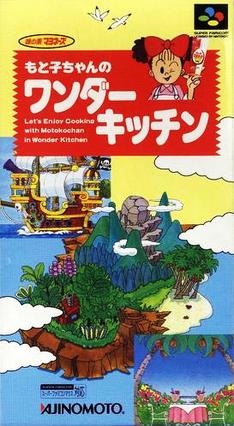Motoko-chan no Wonder Kitchen
Motoko-chan no Wonder Kitchen is a promotional video game developed for the Super Famicom. It was released exclusively in Japan in 1993. The game was created as a marketing tool for Ajinomoto, a well-known Japanese food and chemical corporation. It is often categorized under the genres of adventure and educational games, aiming to teach players about nutrition and cooking through interactive gameplay and storytelling.
Gameplay[edit | edit source]
In Motoko-chan no Wonder Kitchen, players take on the role of the titular character, Motoko, as she embarks on a culinary adventure. The gameplay primarily involves exploring various environments, interacting with characters, and solving puzzles related to food preparation and nutrition. Players are tasked with collecting ingredients and cooking meals, all the while learning about the nutritional value and cultural significance of different foods. The game uniquely blends educational content with entertainment, using the interactive medium of video games to engage and inform players.
Development and Release[edit | edit source]
The development of Motoko-chan no Wonder Kitchen was a collaborative effort between Ajinomoto and a video game developer, aiming to create an engaging platform to promote Ajinomoto's products and educate the public about nutrition. The game was distributed as a promotional item and was not available for purchase in the traditional sense. Instead, it was given away to customers who purchased certain Ajinomoto products or through special promotions.
Reception and Legacy[edit | edit source]
As a promotional tool, Motoko-chan no Wonder Kitchen did not receive the same level of attention or critical analysis as commercial video games. However, it represents an interesting case study in the use of video games for marketing and educational purposes. The game is remembered for its unique approach to advertising and its attempt to blend educational content with interactive entertainment.
In the years following its release, Motoko-chan no Wonder Kitchen has gained a certain level of notoriety among video game collectors and enthusiasts, particularly those interested in the history of video games and unusual marketing tactics. It is often cited as an example of the diverse ways in which video games can be utilized beyond mere entertainment.
See Also[edit | edit source]
Search WikiMD
Ad.Tired of being Overweight? Try W8MD's physician weight loss program.
Semaglutide (Ozempic / Wegovy and Tirzepatide (Mounjaro / Zepbound) available.
Advertise on WikiMD
|
WikiMD's Wellness Encyclopedia |
| Let Food Be Thy Medicine Medicine Thy Food - Hippocrates |
Translate this page: - East Asian
中文,
日本,
한국어,
South Asian
हिन्दी,
தமிழ்,
తెలుగు,
Urdu,
ಕನ್ನಡ,
Southeast Asian
Indonesian,
Vietnamese,
Thai,
မြန်မာဘာသာ,
বাংলা
European
español,
Deutsch,
français,
Greek,
português do Brasil,
polski,
română,
русский,
Nederlands,
norsk,
svenska,
suomi,
Italian
Middle Eastern & African
عربى,
Turkish,
Persian,
Hebrew,
Afrikaans,
isiZulu,
Kiswahili,
Other
Bulgarian,
Hungarian,
Czech,
Swedish,
മലയാളം,
मराठी,
ਪੰਜਾਬੀ,
ગુજરાતી,
Portuguese,
Ukrainian
Medical Disclaimer: WikiMD is not a substitute for professional medical advice. The information on WikiMD is provided as an information resource only, may be incorrect, outdated or misleading, and is not to be used or relied on for any diagnostic or treatment purposes. Please consult your health care provider before making any healthcare decisions or for guidance about a specific medical condition. WikiMD expressly disclaims responsibility, and shall have no liability, for any damages, loss, injury, or liability whatsoever suffered as a result of your reliance on the information contained in this site. By visiting this site you agree to the foregoing terms and conditions, which may from time to time be changed or supplemented by WikiMD. If you do not agree to the foregoing terms and conditions, you should not enter or use this site. See full disclaimer.
Credits:Most images are courtesy of Wikimedia commons, and templates Wikipedia, licensed under CC BY SA or similar.
Contributors: Prab R. Tumpati, MD

